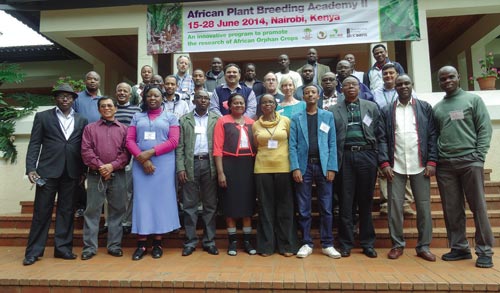By B.M. Prasanna and Rita Mumm/CIMMYT

The African Plant Breeding Academy (AfPBA) held a two-week training course on plant breeding at the World Agroforestry Centre campus in Nairobi 15-28 June. The AfPBA is a continuing education program organized by the University of California, Davis and an initiative of the African Orphan Crops Consortium. It is designed to sharpen skills of plant breeders across Africa on the use of new technologies and current proven approaches to improve genetic gains and efficiencies, leading to increased food security, and to promote innovative research on African orphan crops. The program, which debuted in December 2013, consists of three two-week sessions. This was the second session, with the final session scheduled for December.
The first group of students in the AfPBA has 24 young scientists from 11 countries in Africa — Burkina Faso, Côte-d’Ivoire, Ethiopia, Ghana, Kenya, Mozambique, Niger, Nigeria, Rwanda, Senegal and Zimbabwe — and includes four women. The core instructors for the session were Bruce Walsh (University of Arizona), Iago Hale (University of New Hampshire), Allen Van Deynze (University of California, Davis), and Rita H. Mumm (University of Illinois), who also directs the AfPBA and will become a member of the CIMMYT Board of Trustees at its September meeting.
Topics covered in this session included multiple trait selection approaches such as selection indices and marker-assisted selection; multi-year, multilocation experimental designs and data analysis tools; approaches to phenotypic evaluation including specialized testing environments and use of secondary traits; and ways to manage and exploit geneenvironment interaction. AfPBA’s practice is to present concepts, principles and tools, then demonstrate these in action through actual breeding programs. This provides an opportunity for AfPBA students to ask practical questions about breeding targets and means to achieve them.
A team of CIMMYT Global Maize Program scientists based in Nairobi were invited to demonstrate some of the breeding concepts in action. On 19 June, B.M. Prasanna and his team presented their approaches and accomplishments pertaining to stress-resilient and nutritionally enriched maize germplasm development and delivery in the tropics (Prasanna); drought-tolerant maize for Africa (Tsedeke Abate); water use-efficient and insect-resistant maize germplasm for Africa (Stephen Mugo); nitrogen use-efficient germplasm for Africa (Bish Das); maize lethal necrosis in east Africa (George Mahuku); nutritionally enriched maize for the tropics (Dan Makumbi); molecular markerassisted breeding and genomic selection for maize improvement (Kassa Semagn and Yoseph Beyene); doubled-haploid technology for enhancing genetic gains and breeding efficiency (Prasanna and Sotero Bumagat). The students were quite enthusiastic about the interaction with CIMMYT scientists, and they shared their views on the improved maize development and deployment strategies in Africa.
 Capacity development
Capacity development 
